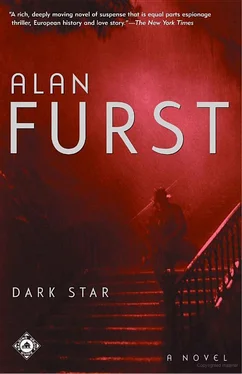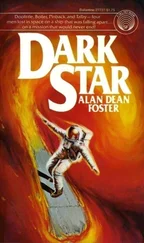Alan Furst - Dark Star
Здесь есть возможность читать онлайн «Alan Furst - Dark Star» весь текст электронной книги совершенно бесплатно (целиком полную версию без сокращений). В некоторых случаях можно слушать аудио, скачать через торрент в формате fb2 и присутствует краткое содержание. Жанр: Шпионский детектив, на английском языке. Описание произведения, (предисловие) а так же отзывы посетителей доступны на портале библиотеки ЛибКат.
- Название:Dark Star
- Автор:
- Жанр:
- Год:неизвестен
- ISBN:нет данных
- Рейтинг книги:3 / 5. Голосов: 1
-
Избранное:Добавить в избранное
- Отзывы:
-
Ваша оценка:
- 60
- 1
- 2
- 3
- 4
- 5
Dark Star: краткое содержание, описание и аннотация
Предлагаем к чтению аннотацию, описание, краткое содержание или предисловие (зависит от того, что написал сам автор книги «Dark Star»). Если вы не нашли необходимую информацию о книге — напишите в комментариях, мы постараемся отыскать её.
Dark Star — читать онлайн бесплатно полную книгу (весь текст) целиком
Ниже представлен текст книги, разбитый по страницам. Система сохранения места последней прочитанной страницы, позволяет с удобством читать онлайн бесплатно книгу «Dark Star», без необходимости каждый раз заново искать на чём Вы остановились. Поставьте закладку, и сможете в любой момент перейти на страницу, на которой закончили чтение.
Интервал:
Закладка:
He stopped back that evening, picked up the ticket and drew both salary and expense funds, then went early to the Gare d’Austerlitz the following day in case they wanted to talk to him there. He did not precisely fear abduction, he was simply more comfortable in an open, public space with crowds of people about. He dawdled over coffee at a cafe by the departure platform, gazed mindlessly at the sullen Parisian sky above the glass roof on its vast iron fretwork, read Le Temps, found himself quoted in the Communist daily, L’Humanite -“as Pravda correspondent Andre Szara has pointed out, bilateral relations between France and the USSR can only proceed once the Czechoslovakian question has been …”-and watched the appetizing French women sweep past, their heels clattering on the cement, their animation seemingly inspired by a grave sense of mission.
He had made himself available, but no contact was made. When his train was announced and the engine vented plumes of white steam on the platform, he climbed aboard and found himself alone in a first-class compartment. Pravda did not buy whole compartments- only the apparat did that. Clearly, something was planned. Perhaps in Nancy, he thought.
He was wrong. Spent the afternoon staring through the rain at the low hills of eastern France and watching the names of battlefields glide past on the railroad stations. At the Strasbourg border control, just on the other side of the Rhine, a trio of German passport officials, two soldiers and a civilian in streaming black rubber raincoats, entered the compartment. They were cold-eyed and courteous, and his Soviet passport produced no evident reaction. They asked him a question or two, apparently just to hear his voice. Szara’s German was that of someone who’d spoken Yiddish as a child, and the civilian, a security type, made clear that he knew Szara was a Jew, a Polish Jew, a Soviet Bolshevik Jew of Polish origin. He probed efficiently through Szara’s traveling bag without removing his black gloves, then examined press and travel documents and, when he was done, stamped the passport with a fat swastika in a circle and handed it back politely. Their eyes met for just a moment: this business they had with each other would be seen to in the future, that far they could agree.
But Szara traveled too much to take the hostility of border police to heart and, as they gained speed leaving Stuttgart station, he fell into the rhythm of the tracks and the dense twilight of Germany: smoking factories on the horizon, fields left to the November frost.
He touched the baggage receipt in the inside pocket of his jacket for the tenth time that day; he might have taken yet one more look at the thing, but the sound of the train was suddenly amplified as the door to his compartment swung open.
On first glance, an ordinary businessman of Central Europe in dark overcoat and soft-brimmed hat, carrying a buckled briefcase of the kind that is held under one arm. Then, recognition. This was a man to whom he had been briefly introduced, perhaps a year earlier, at some Moscow function he couldn’t recall. His name was Bloch, a lieutenant general of the GRU, military intelligence, and recently, according to rumor, the illegal-clandestine- rezident operating GRU and NKVD networks based in Tarragona. Thus a very senior member of the Soviet cadre involved in the Spanish Civil War.
Szara was immediately on his guard; powerful people in Moscow were afraid of this man. It was nothing specific. Those who knew the details didn’t tell war stories, but they veered away from his name when it came up in conversation, looked around to see who might be listening, made a certain gesture of the face that meant stay away. What little was said about Bloch implied an insatiable appetite for success-an appetite gratified by means of ferocious tyranny. Life for those assigned to work for him was said to be a nightmare.
Yaschyeritsa, they called him behind his back, a kind of lizard. Because he had the look of the basilisk: a sharp triangular face, stiff hair combed back flat from the forehead, thin eyebrows angled steeply toward the inner corners of his eyes, which, long and narrow, were set above hard cheekbones that slanted upward.
Andre Szara, like everyone who moved in those circles known as the nomenklatura, the elite, was an adroit reader of faces. You had to know who you were dealing with. A Byelorussian? An Armenian? A native Russian? With Jews, it was often difficult because Jewish women had for centuries borne the children of their tormentors and thus carried the genes of many races. God only knew, Szara thought, what brutal band of marauders had forced themselves on Bloch’s female ancestor to make him look as he did. Did evil, he wondered, travel in the blood as well?
Bloch nodded a greeting, sat down across from Szara, leaned over and locked the compartment door, then turned off the lamps on the wall around the window. The train was moving slowly through a village, and from the darkened compartment they could see that a local festival was in progress; a bonfire in the public square, cattle wearing garlands, Hitler Youth in shorts holding swastika banners hung lengthwise down long poles, like Roman fasces.
Bloch stared intently at the scene. “At last,” he said pensively, “they are back in the Middle Ages.” He turned his attention to Szara. “Forgive me, comrade journalist, I am General Y I. Bloch. I don’t think we’ve ever spoken, but I read your work when I have a moment, so I know who you are. Do I need to tell you who I am? “
“No, comrade General. I know you are with the special services.”
Bloch acknowledged Szara’s awareness as a compliment: a knowing smile, a brief inclination of the head, at your service.
“Tell me,” the general said, “is it true you’ve been away from Moscow for a time? Several months?”
“Since late August,” Szara said.
“No easy life-trains and hotel rooms. Slow steamships. But foreign capitals are certainly more amusing than Moscow, so there are compensations. No? “
This was a trap. There was a doctrinal answer, something to do with building socialism, but Bloch was no fool and Szara suspected a pious response would embarrass them both. “It’s true,” he said, adding, “though one gets tired of being the eternal stranger,” just in case.
“Do you hear the Moscow gossip? “
“Very little,” Szara said. A loner, he tended to avoid the Tass and Pravda crowd on the circuit of European capitals.
Bloch’s face darkened. “This has been a troubled autumn for the services, surely you’ve heard that much.”
“Of course I see the newspapers.”
“There is more, much more. We’ve had defections, serious ones. In the last few weeks, Colonel Alexander Orlov and Colonel Walter Krivitsky, who is called general in the European press, have left the service and sought refuge in the West. The Krivitsky matter has been made public, also the flight of the operative Reiss. As for Orlov, we’ll keep that to ourselves.”
Szara nodded obediently. This had quickly become a very sensitive conversation. Orlov-a cover name within the service, he was in fact Leon Lazarevich Feldbin-and Krivitsky-Samuel Ginsberg- were important men, respectively NKVD and GRU officials of senior status. The Ignace Reiss affair had shocked him when he read about it. Reiss, murdered in Switzerland as he attempted to flee, had been a fervent idealist, a Marxist/Leninist in his bones.
“Friends?” Bloch raised an eyebrow.
“I knew Reiss to say hello to. No more than that.”
“And you? How does it go with you? ” Bloch was concerned, almost fatherly. Szara wanted to laugh, had the services been panicked into kindness?
Читать дальшеИнтервал:
Закладка:
Похожие книги на «Dark Star»
Представляем Вашему вниманию похожие книги на «Dark Star» списком для выбора. Мы отобрали схожую по названию и смыслу литературу в надежде предоставить читателям больше вариантов отыскать новые, интересные, ещё непрочитанные произведения.
Обсуждение, отзывы о книге «Dark Star» и просто собственные мнения читателей. Оставьте ваши комментарии, напишите, что Вы думаете о произведении, его смысле или главных героях. Укажите что конкретно понравилось, а что нет, и почему Вы так считаете.












